Analyzing Socialization: Its Role in Child's Learning and Development
VerifiedAdded on 2023/06/14
|11
|3483
|416
Essay
AI Summary
This essay provides a comprehensive overview of socialization and its profound impact on a child's learning and development. It begins by defining socialization as the process through which an infant transforms into a social being, capable of interacting with others, and highlights the aims of socialization, including developing self-concept, enabling self-regulation, empowering achievement, teaching social rules, and implementing developmental skills. The essay identifies key agents of socialization, such as family, peers, the educational system, media, and religion, each playing a distinct role in shaping a child's values and behaviors. It further discusses the methods of socialization, including affective, operant, and observational methods, and elaborates on the impact of socialization on a child's learning and development across various stages of life, from infancy to young adulthood, emphasizing the psychological, emotional, social, and physical aspects of development, while noting both the positive and negative influences that can shape a child's trajectory.
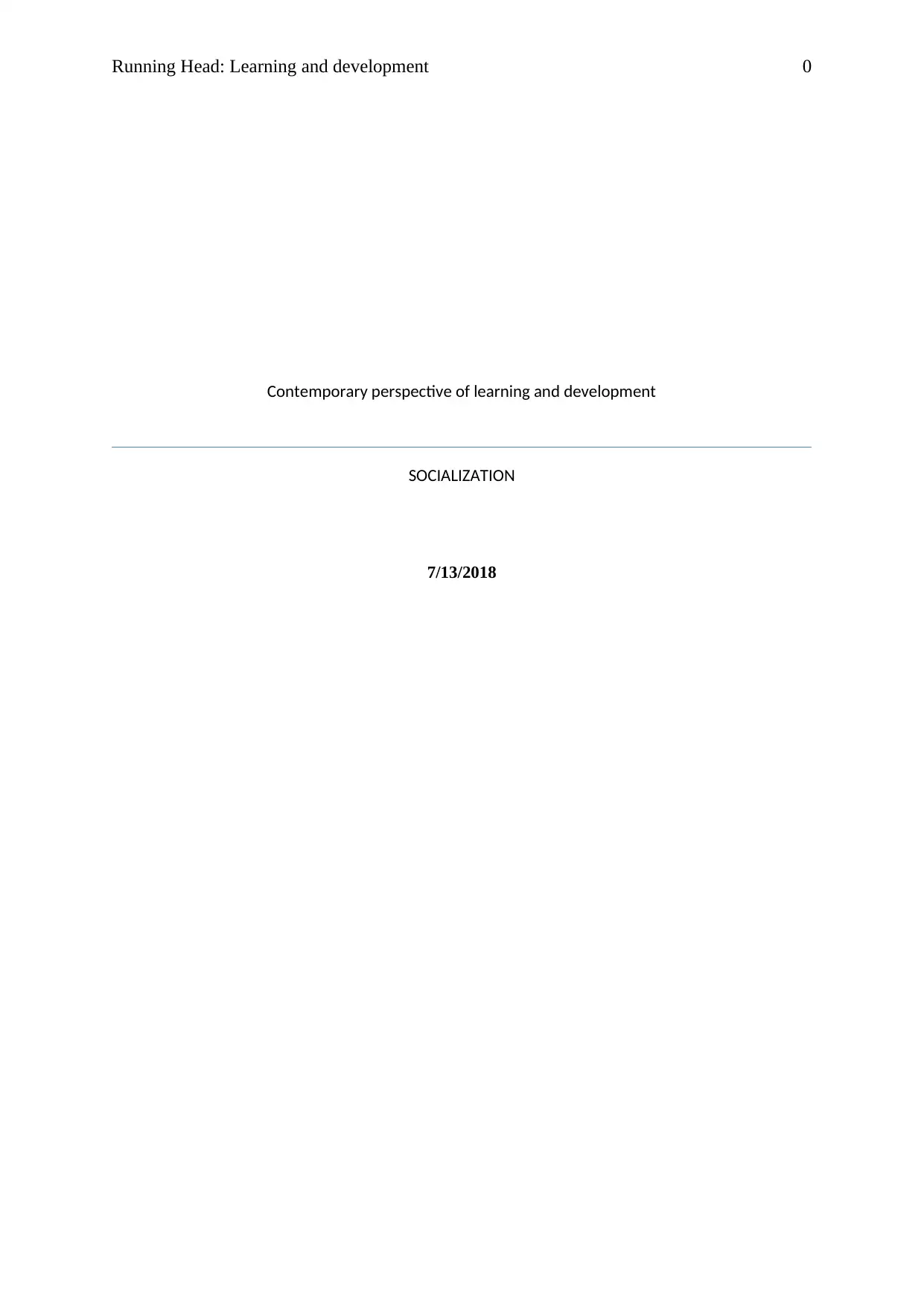
Running Head: Learning and development 0
Contemporary perspective of learning and development
SOCIALIZATION
7/13/2018
Contemporary perspective of learning and development
SOCIALIZATION
7/13/2018
Paraphrase This Document
Need a fresh take? Get an instant paraphrase of this document with our AI Paraphraser
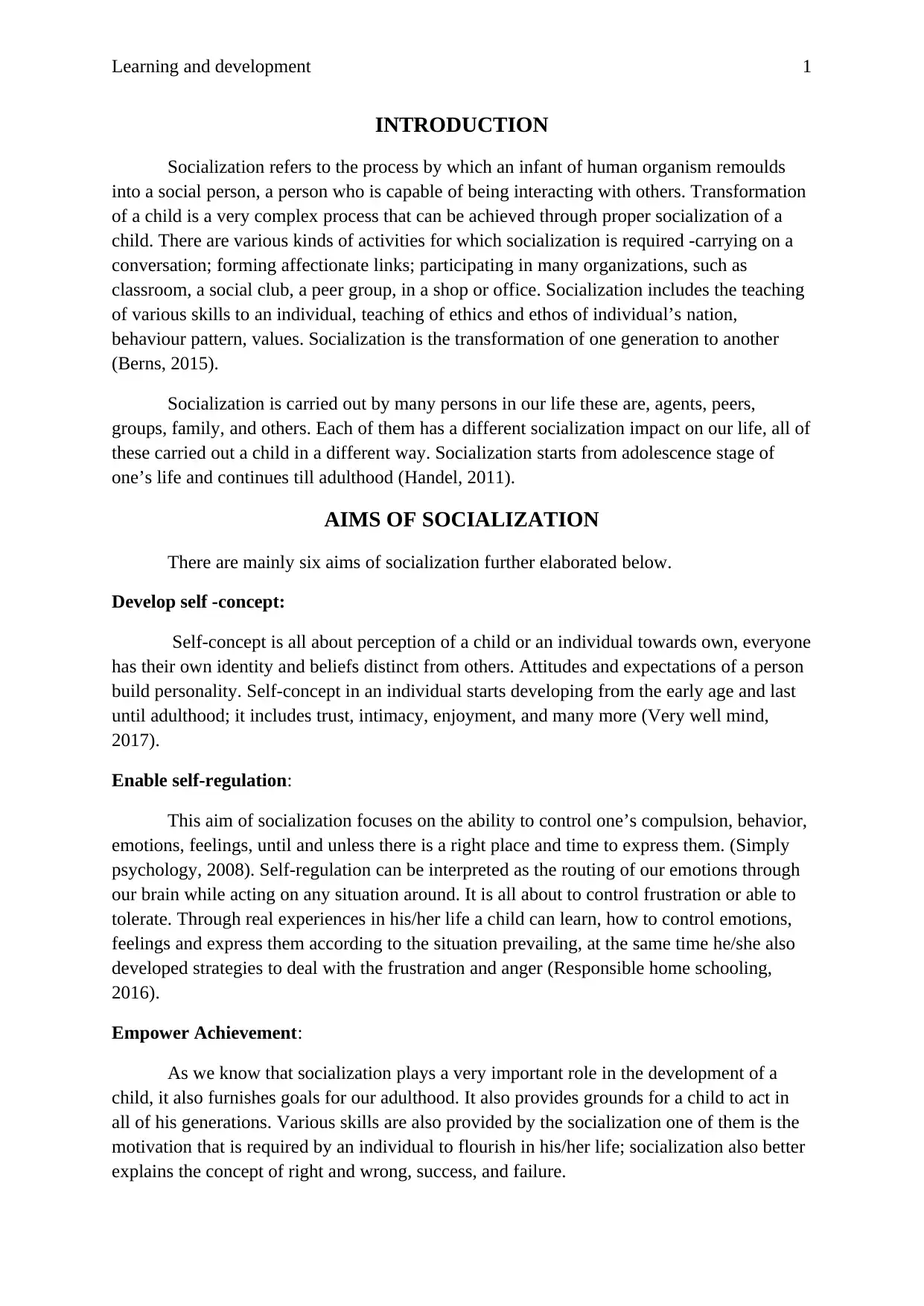
Learning and development 1
INTRODUCTION
Socialization refers to the process by which an infant of human organism remoulds
into a social person, a person who is capable of being interacting with others. Transformation
of a child is a very complex process that can be achieved through proper socialization of a
child. There are various kinds of activities for which socialization is required -carrying on a
conversation; forming affectionate links; participating in many organizations, such as
classroom, a social club, a peer group, in a shop or office. Socialization includes the teaching
of various skills to an individual, teaching of ethics and ethos of individual’s nation,
behaviour pattern, values. Socialization is the transformation of one generation to another
(Berns, 2015).
Socialization is carried out by many persons in our life these are, agents, peers,
groups, family, and others. Each of them has a different socialization impact on our life, all of
these carried out a child in a different way. Socialization starts from adolescence stage of
one’s life and continues till adulthood (Handel, 2011).
AIMS OF SOCIALIZATION
There are mainly six aims of socialization further elaborated below.
Develop self -concept:
Self-concept is all about perception of a child or an individual towards own, everyone
has their own identity and beliefs distinct from others. Attitudes and expectations of a person
build personality. Self-concept in an individual starts developing from the early age and last
until adulthood; it includes trust, intimacy, enjoyment, and many more (Very well mind,
2017).
Enable self-regulation:
This aim of socialization focuses on the ability to control one’s compulsion, behavior,
emotions, feelings, until and unless there is a right place and time to express them. (Simply
psychology, 2008). Self-regulation can be interpreted as the routing of our emotions through
our brain while acting on any situation around. It is all about to control frustration or able to
tolerate. Through real experiences in his/her life a child can learn, how to control emotions,
feelings and express them according to the situation prevailing, at the same time he/she also
developed strategies to deal with the frustration and anger (Responsible home schooling,
2016).
Empower Achievement:
As we know that socialization plays a very important role in the development of a
child, it also furnishes goals for our adulthood. It also provides grounds for a child to act in
all of his generations. Various skills are also provided by the socialization one of them is the
motivation that is required by an individual to flourish in his/her life; socialization also better
explains the concept of right and wrong, success, and failure.
INTRODUCTION
Socialization refers to the process by which an infant of human organism remoulds
into a social person, a person who is capable of being interacting with others. Transformation
of a child is a very complex process that can be achieved through proper socialization of a
child. There are various kinds of activities for which socialization is required -carrying on a
conversation; forming affectionate links; participating in many organizations, such as
classroom, a social club, a peer group, in a shop or office. Socialization includes the teaching
of various skills to an individual, teaching of ethics and ethos of individual’s nation,
behaviour pattern, values. Socialization is the transformation of one generation to another
(Berns, 2015).
Socialization is carried out by many persons in our life these are, agents, peers,
groups, family, and others. Each of them has a different socialization impact on our life, all of
these carried out a child in a different way. Socialization starts from adolescence stage of
one’s life and continues till adulthood (Handel, 2011).
AIMS OF SOCIALIZATION
There are mainly six aims of socialization further elaborated below.
Develop self -concept:
Self-concept is all about perception of a child or an individual towards own, everyone
has their own identity and beliefs distinct from others. Attitudes and expectations of a person
build personality. Self-concept in an individual starts developing from the early age and last
until adulthood; it includes trust, intimacy, enjoyment, and many more (Very well mind,
2017).
Enable self-regulation:
This aim of socialization focuses on the ability to control one’s compulsion, behavior,
emotions, feelings, until and unless there is a right place and time to express them. (Simply
psychology, 2008). Self-regulation can be interpreted as the routing of our emotions through
our brain while acting on any situation around. It is all about to control frustration or able to
tolerate. Through real experiences in his/her life a child can learn, how to control emotions,
feelings and express them according to the situation prevailing, at the same time he/she also
developed strategies to deal with the frustration and anger (Responsible home schooling,
2016).
Empower Achievement:
As we know that socialization plays a very important role in the development of a
child, it also furnishes goals for our adulthood. It also provides grounds for a child to act in
all of his generations. Various skills are also provided by the socialization one of them is the
motivation that is required by an individual to flourish in his/her life; socialization also better
explains the concept of right and wrong, success, and failure.
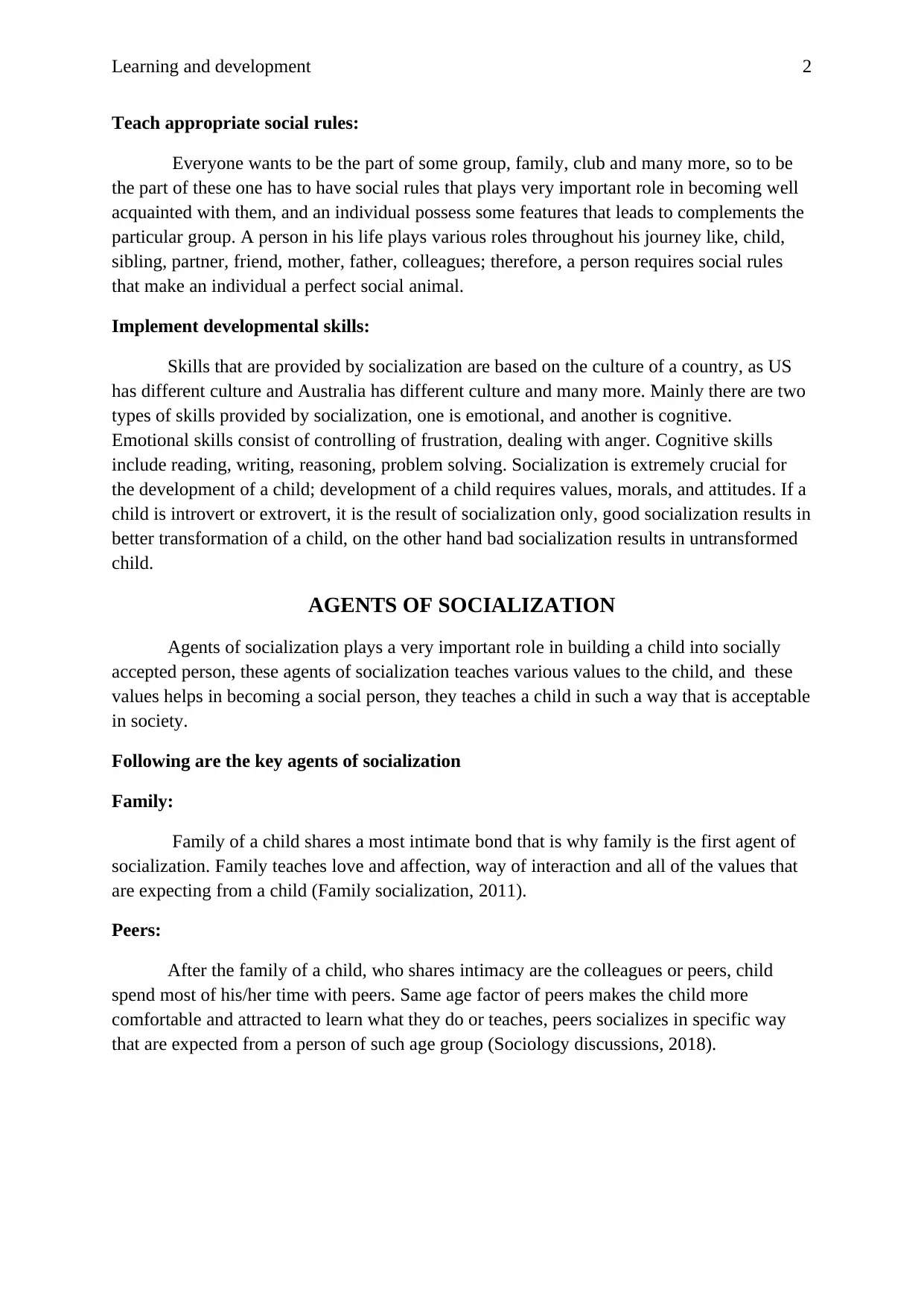
Learning and development 2
Teach appropriate social rules:
Everyone wants to be the part of some group, family, club and many more, so to be
the part of these one has to have social rules that plays very important role in becoming well
acquainted with them, and an individual possess some features that leads to complements the
particular group. A person in his life plays various roles throughout his journey like, child,
sibling, partner, friend, mother, father, colleagues; therefore, a person requires social rules
that make an individual a perfect social animal.
Implement developmental skills:
Skills that are provided by socialization are based on the culture of a country, as US
has different culture and Australia has different culture and many more. Mainly there are two
types of skills provided by socialization, one is emotional, and another is cognitive.
Emotional skills consist of controlling of frustration, dealing with anger. Cognitive skills
include reading, writing, reasoning, problem solving. Socialization is extremely crucial for
the development of a child; development of a child requires values, morals, and attitudes. If a
child is introvert or extrovert, it is the result of socialization only, good socialization results in
better transformation of a child, on the other hand bad socialization results in untransformed
child.
AGENTS OF SOCIALIZATION
Agents of socialization plays a very important role in building a child into socially
accepted person, these agents of socialization teaches various values to the child, and these
values helps in becoming a social person, they teaches a child in such a way that is acceptable
in society.
Following are the key agents of socialization
Family:
Family of a child shares a most intimate bond that is why family is the first agent of
socialization. Family teaches love and affection, way of interaction and all of the values that
are expecting from a child (Family socialization, 2011).
Peers:
After the family of a child, who shares intimacy are the colleagues or peers, child
spend most of his/her time with peers. Same age factor of peers makes the child more
comfortable and attracted to learn what they do or teaches, peers socializes in specific way
that are expected from a person of such age group (Sociology discussions, 2018).
Teach appropriate social rules:
Everyone wants to be the part of some group, family, club and many more, so to be
the part of these one has to have social rules that plays very important role in becoming well
acquainted with them, and an individual possess some features that leads to complements the
particular group. A person in his life plays various roles throughout his journey like, child,
sibling, partner, friend, mother, father, colleagues; therefore, a person requires social rules
that make an individual a perfect social animal.
Implement developmental skills:
Skills that are provided by socialization are based on the culture of a country, as US
has different culture and Australia has different culture and many more. Mainly there are two
types of skills provided by socialization, one is emotional, and another is cognitive.
Emotional skills consist of controlling of frustration, dealing with anger. Cognitive skills
include reading, writing, reasoning, problem solving. Socialization is extremely crucial for
the development of a child; development of a child requires values, morals, and attitudes. If a
child is introvert or extrovert, it is the result of socialization only, good socialization results in
better transformation of a child, on the other hand bad socialization results in untransformed
child.
AGENTS OF SOCIALIZATION
Agents of socialization plays a very important role in building a child into socially
accepted person, these agents of socialization teaches various values to the child, and these
values helps in becoming a social person, they teaches a child in such a way that is acceptable
in society.
Following are the key agents of socialization
Family:
Family of a child shares a most intimate bond that is why family is the first agent of
socialization. Family teaches love and affection, way of interaction and all of the values that
are expecting from a child (Family socialization, 2011).
Peers:
After the family of a child, who shares intimacy are the colleagues or peers, child
spend most of his/her time with peers. Same age factor of peers makes the child more
comfortable and attracted to learn what they do or teaches, peers socializes in specific way
that are expected from a person of such age group (Sociology discussions, 2018).
⊘ This is a preview!⊘
Do you want full access?
Subscribe today to unlock all pages.

Trusted by 1+ million students worldwide
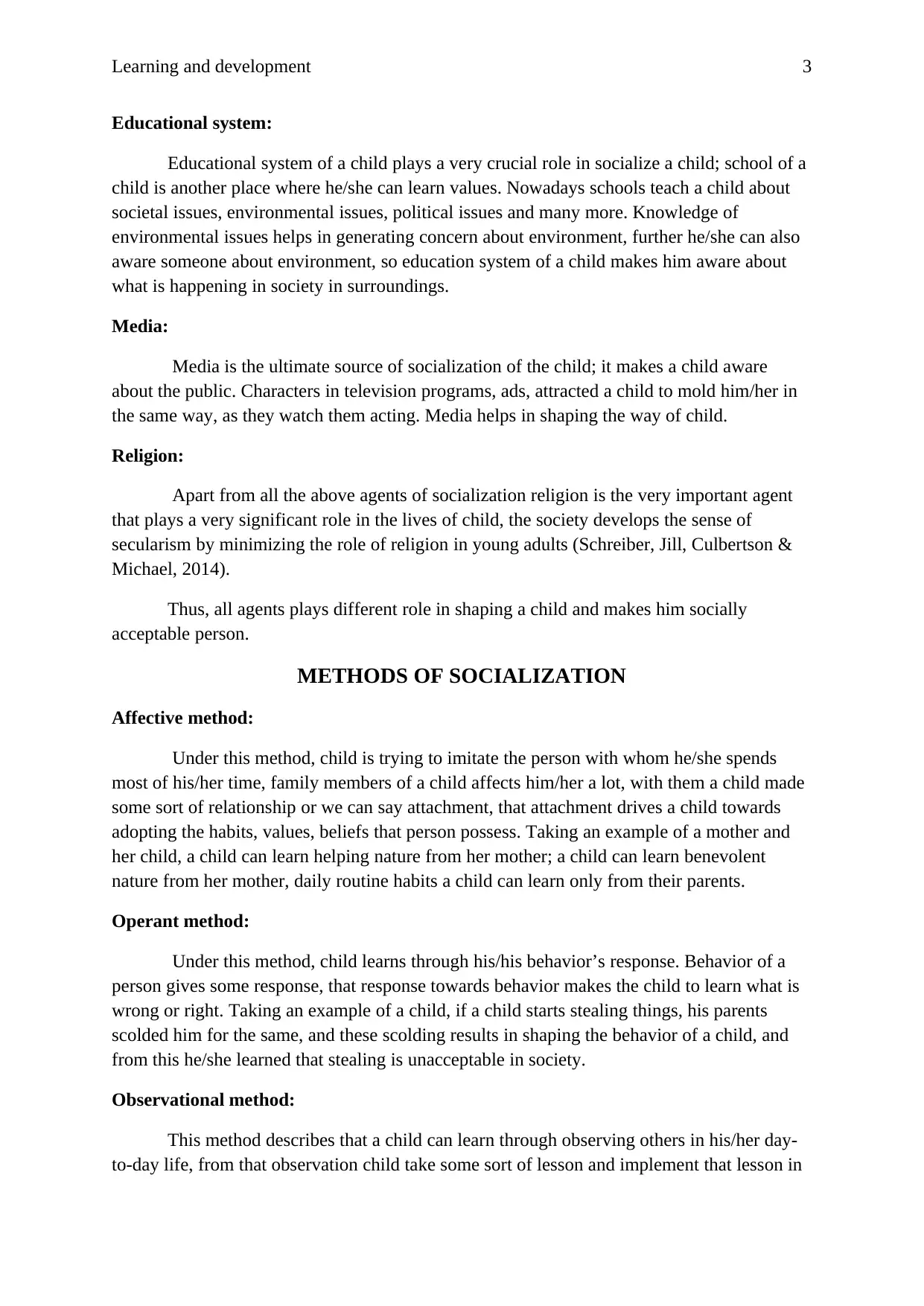
Learning and development 3
Educational system:
Educational system of a child plays a very crucial role in socialize a child; school of a
child is another place where he/she can learn values. Nowadays schools teach a child about
societal issues, environmental issues, political issues and many more. Knowledge of
environmental issues helps in generating concern about environment, further he/she can also
aware someone about environment, so education system of a child makes him aware about
what is happening in society in surroundings.
Media:
Media is the ultimate source of socialization of the child; it makes a child aware
about the public. Characters in television programs, ads, attracted a child to mold him/her in
the same way, as they watch them acting. Media helps in shaping the way of child.
Religion:
Apart from all the above agents of socialization religion is the very important agent
that plays a very significant role in the lives of child, the society develops the sense of
secularism by minimizing the role of religion in young adults (Schreiber, Jill, Culbertson &
Michael, 2014).
Thus, all agents plays different role in shaping a child and makes him socially
acceptable person.
METHODS OF SOCIALIZATION
Affective method:
Under this method, child is trying to imitate the person with whom he/she spends
most of his/her time, family members of a child affects him/her a lot, with them a child made
some sort of relationship or we can say attachment, that attachment drives a child towards
adopting the habits, values, beliefs that person possess. Taking an example of a mother and
her child, a child can learn helping nature from her mother; a child can learn benevolent
nature from her mother, daily routine habits a child can learn only from their parents.
Operant method:
Under this method, child learns through his/his behavior’s response. Behavior of a
person gives some response, that response towards behavior makes the child to learn what is
wrong or right. Taking an example of a child, if a child starts stealing things, his parents
scolded him for the same, and these scolding results in shaping the behavior of a child, and
from this he/she learned that stealing is unacceptable in society.
Observational method:
This method describes that a child can learn through observing others in his/her day-
to-day life, from that observation child take some sort of lesson and implement that lesson in
Educational system:
Educational system of a child plays a very crucial role in socialize a child; school of a
child is another place where he/she can learn values. Nowadays schools teach a child about
societal issues, environmental issues, political issues and many more. Knowledge of
environmental issues helps in generating concern about environment, further he/she can also
aware someone about environment, so education system of a child makes him aware about
what is happening in society in surroundings.
Media:
Media is the ultimate source of socialization of the child; it makes a child aware
about the public. Characters in television programs, ads, attracted a child to mold him/her in
the same way, as they watch them acting. Media helps in shaping the way of child.
Religion:
Apart from all the above agents of socialization religion is the very important agent
that plays a very significant role in the lives of child, the society develops the sense of
secularism by minimizing the role of religion in young adults (Schreiber, Jill, Culbertson &
Michael, 2014).
Thus, all agents plays different role in shaping a child and makes him socially
acceptable person.
METHODS OF SOCIALIZATION
Affective method:
Under this method, child is trying to imitate the person with whom he/she spends
most of his/her time, family members of a child affects him/her a lot, with them a child made
some sort of relationship or we can say attachment, that attachment drives a child towards
adopting the habits, values, beliefs that person possess. Taking an example of a mother and
her child, a child can learn helping nature from her mother; a child can learn benevolent
nature from her mother, daily routine habits a child can learn only from their parents.
Operant method:
Under this method, child learns through his/his behavior’s response. Behavior of a
person gives some response, that response towards behavior makes the child to learn what is
wrong or right. Taking an example of a child, if a child starts stealing things, his parents
scolded him for the same, and these scolding results in shaping the behavior of a child, and
from this he/she learned that stealing is unacceptable in society.
Observational method:
This method describes that a child can learn through observing others in his/her day-
to-day life, from that observation child take some sort of lesson and implement that lesson in
Paraphrase This Document
Need a fresh take? Get an instant paraphrase of this document with our AI Paraphraser
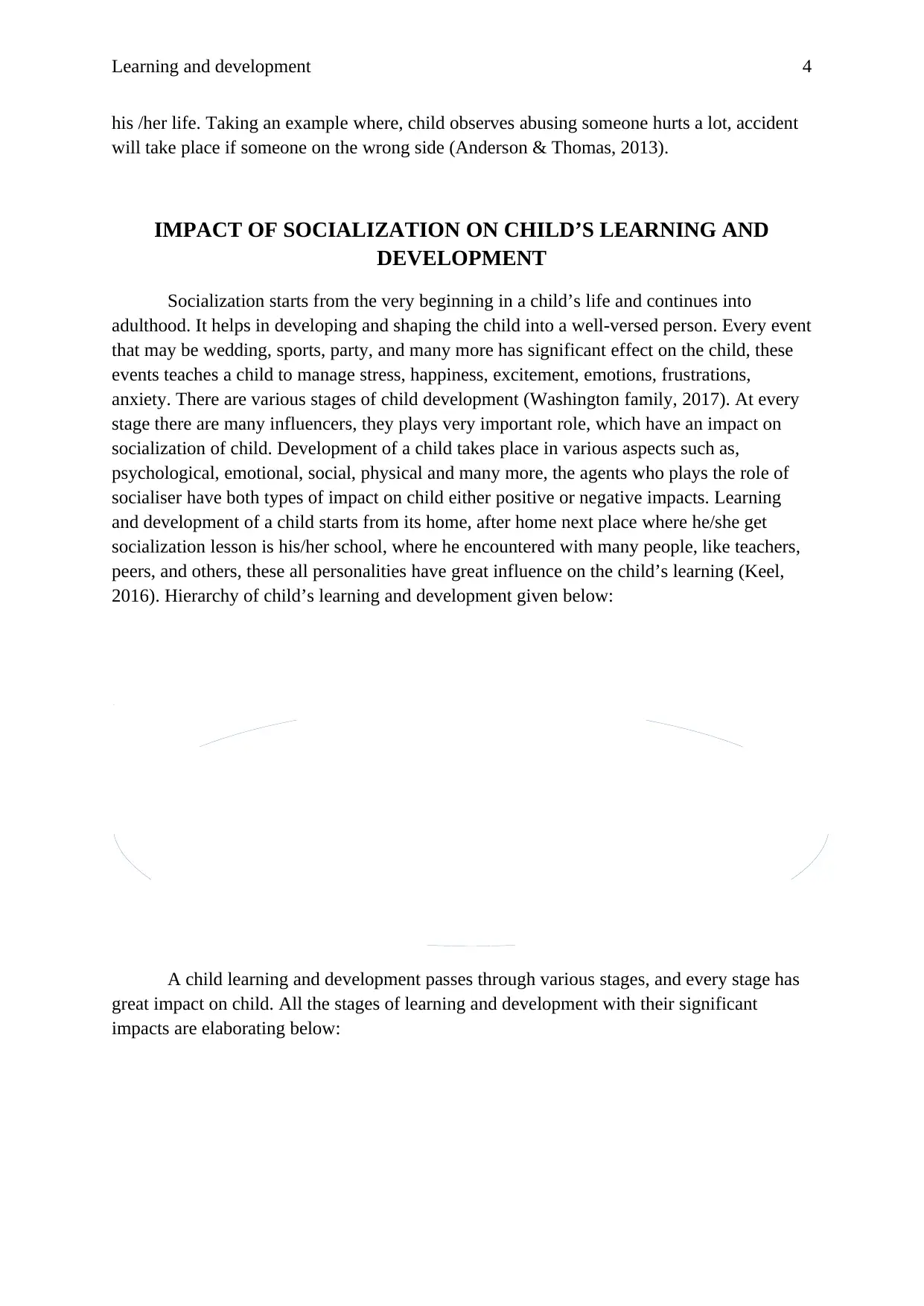
Learning and development 4
his /her life. Taking an example where, child observes abusing someone hurts a lot, accident
will take place if someone on the wrong side (Anderson & Thomas, 2013).
IMPACT OF SOCIALIZATION ON CHILD’S LEARNING AND
DEVELOPMENT
Socialization starts from the very beginning in a child’s life and continues into
adulthood. It helps in developing and shaping the child into a well-versed person. Every event
that may be wedding, sports, party, and many more has significant effect on the child, these
events teaches a child to manage stress, happiness, excitement, emotions, frustrations,
anxiety. There are various stages of child development (Washington family, 2017). At every
stage there are many influencers, they plays very important role, which have an impact on
socialization of child. Development of a child takes place in various aspects such as,
psychological, emotional, social, physical and many more, the agents who plays the role of
socialiser have both types of impact on child either positive or negative impacts. Learning
and development of a child starts from its home, after home next place where he/she get
socialization lesson is his/her school, where he encountered with many people, like teachers,
peers, and others, these all personalities have great influence on the child’s learning (Keel,
2016). Hierarchy of child’s learning and development given below:
A child learning and development passes through various stages, and every stage has
great impact on child. All the stages of learning and development with their significant
impacts are elaborating below:
FamilyPeersSchoolCommunityMedia
his /her life. Taking an example where, child observes abusing someone hurts a lot, accident
will take place if someone on the wrong side (Anderson & Thomas, 2013).
IMPACT OF SOCIALIZATION ON CHILD’S LEARNING AND
DEVELOPMENT
Socialization starts from the very beginning in a child’s life and continues into
adulthood. It helps in developing and shaping the child into a well-versed person. Every event
that may be wedding, sports, party, and many more has significant effect on the child, these
events teaches a child to manage stress, happiness, excitement, emotions, frustrations,
anxiety. There are various stages of child development (Washington family, 2017). At every
stage there are many influencers, they plays very important role, which have an impact on
socialization of child. Development of a child takes place in various aspects such as,
psychological, emotional, social, physical and many more, the agents who plays the role of
socialiser have both types of impact on child either positive or negative impacts. Learning
and development of a child starts from its home, after home next place where he/she get
socialization lesson is his/her school, where he encountered with many people, like teachers,
peers, and others, these all personalities have great influence on the child’s learning (Keel,
2016). Hierarchy of child’s learning and development given below:
A child learning and development passes through various stages, and every stage has
great impact on child. All the stages of learning and development with their significant
impacts are elaborating below:
FamilyPeersSchoolCommunityMedia
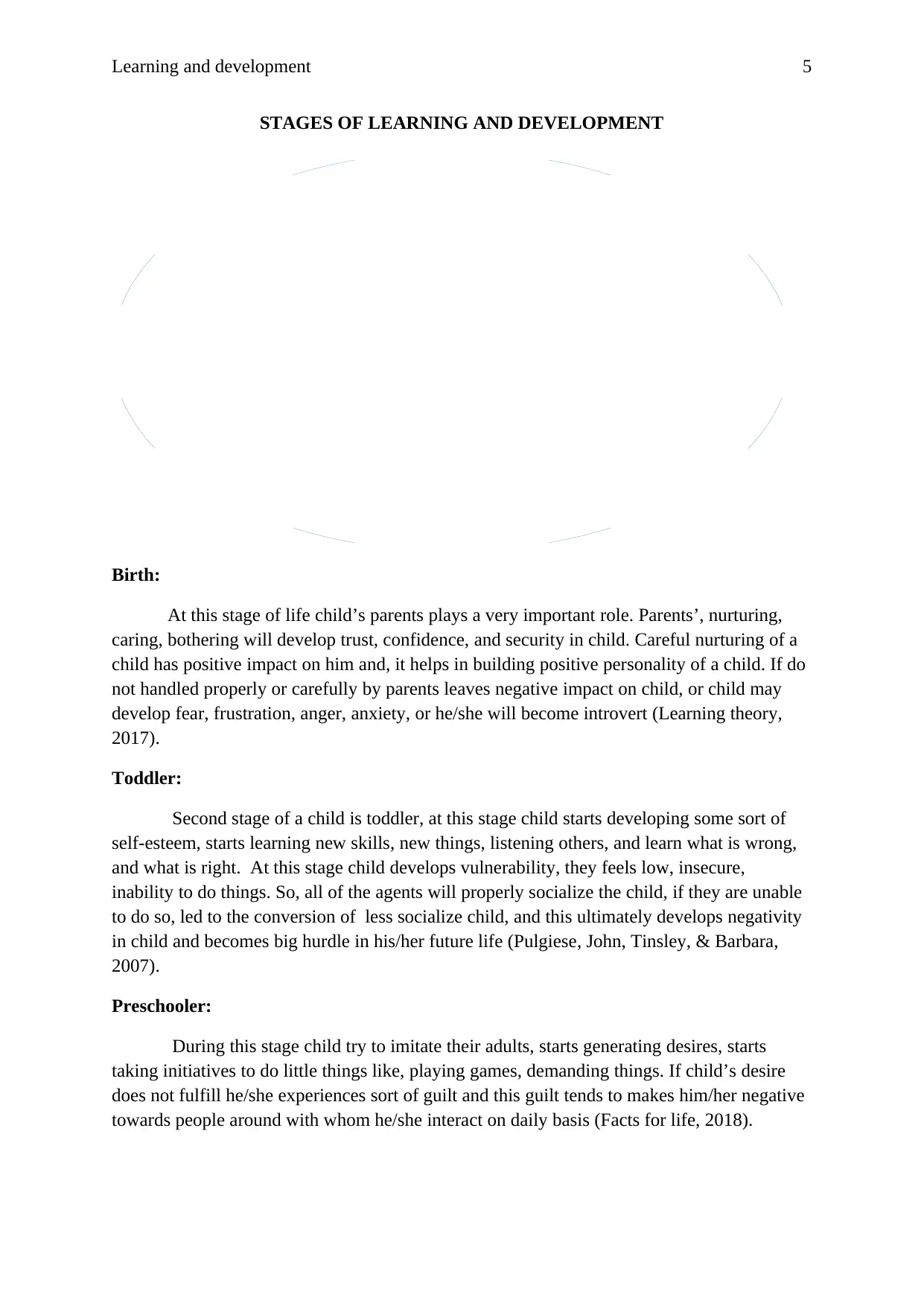
Learning and development 5
STAGES OF LEARNING AND DEVELOPMENT
Birth:
At this stage of life child’s parents plays a very important role. Parents’, nurturing,
caring, bothering will develop trust, confidence, and security in child. Careful nurturing of a
child has positive impact on him and, it helps in building positive personality of a child. If do
not handled properly or carefully by parents leaves negative impact on child, or child may
develop fear, frustration, anger, anxiety, or he/she will become introvert (Learning theory,
2017).
Toddler:
Second stage of a child is toddler, at this stage child starts developing some sort of
self-esteem, starts learning new skills, new things, listening others, and learn what is wrong,
and what is right. At this stage child develops vulnerability, they feels low, insecure,
inability to do things. So, all of the agents will properly socialize the child, if they are unable
to do so, led to the conversion of less socialize child, and this ultimately develops negativity
in child and becomes big hurdle in his/her future life (Pulgiese, John, Tinsley, & Barbara,
2007).
Preschooler:
During this stage child try to imitate their adults, starts generating desires, starts
taking initiatives to do little things like, playing games, demanding things. If child’s desire
does not fulfill he/she experiences sort of guilt and this guilt tends to makes him/her negative
towards people around with whom he/she interact on daily basis (Facts for life, 2018).
InfantToddlerPreschoolSchoolAdolescentYoungadultMiddleagedLateadult
STAGES OF LEARNING AND DEVELOPMENT
Birth:
At this stage of life child’s parents plays a very important role. Parents’, nurturing,
caring, bothering will develop trust, confidence, and security in child. Careful nurturing of a
child has positive impact on him and, it helps in building positive personality of a child. If do
not handled properly or carefully by parents leaves negative impact on child, or child may
develop fear, frustration, anger, anxiety, or he/she will become introvert (Learning theory,
2017).
Toddler:
Second stage of a child is toddler, at this stage child starts developing some sort of
self-esteem, starts learning new skills, new things, listening others, and learn what is wrong,
and what is right. At this stage child develops vulnerability, they feels low, insecure,
inability to do things. So, all of the agents will properly socialize the child, if they are unable
to do so, led to the conversion of less socialize child, and this ultimately develops negativity
in child and becomes big hurdle in his/her future life (Pulgiese, John, Tinsley, & Barbara,
2007).
Preschooler:
During this stage child try to imitate their adults, starts generating desires, starts
taking initiatives to do little things like, playing games, demanding things. If child’s desire
does not fulfill he/she experiences sort of guilt and this guilt tends to makes him/her negative
towards people around with whom he/she interact on daily basis (Facts for life, 2018).
InfantToddlerPreschoolSchoolAdolescentYoungadultMiddleagedLateadult
⊘ This is a preview!⊘
Do you want full access?
Subscribe today to unlock all pages.

Trusted by 1+ million students worldwide
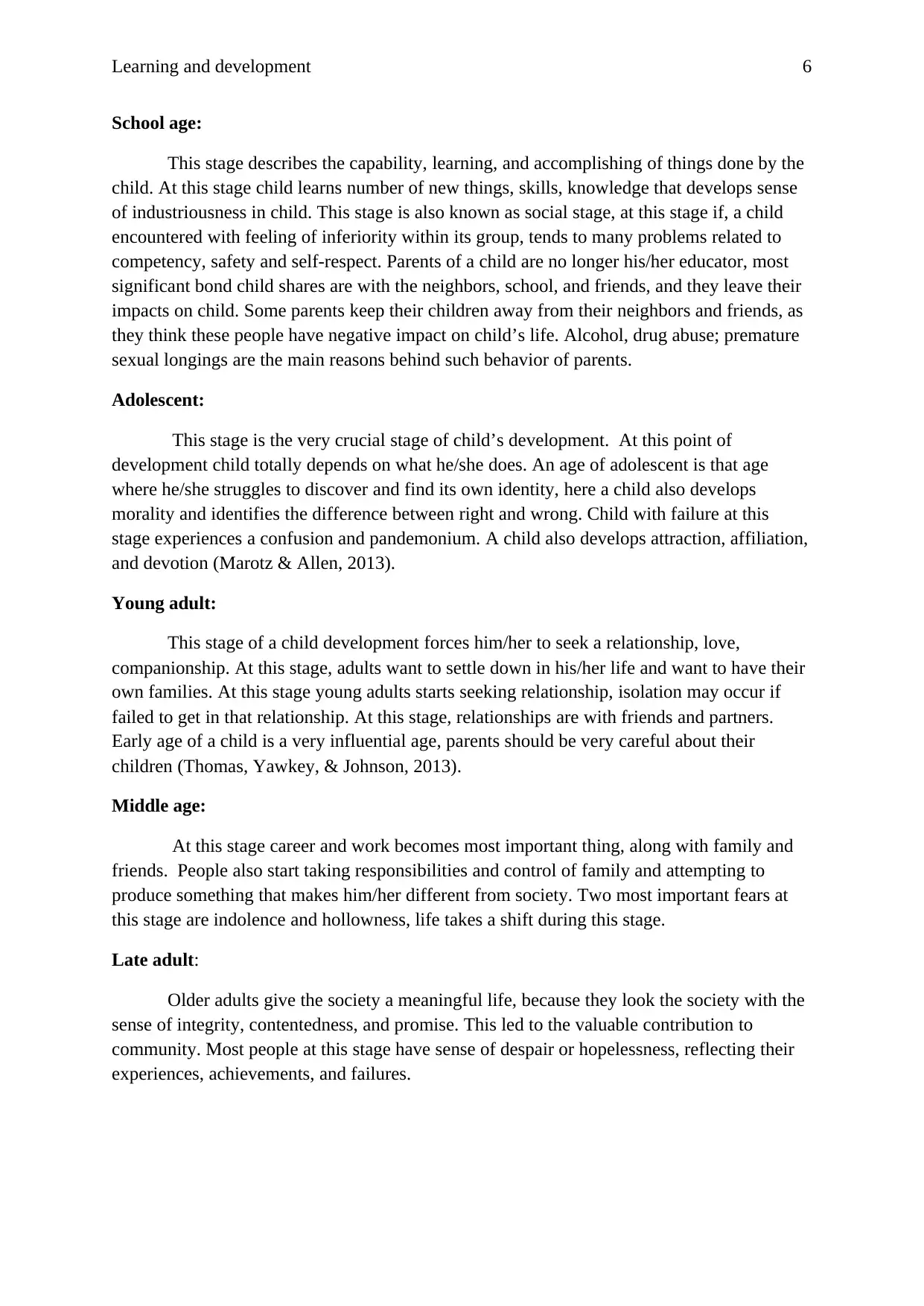
Learning and development 6
School age:
This stage describes the capability, learning, and accomplishing of things done by the
child. At this stage child learns number of new things, skills, knowledge that develops sense
of industriousness in child. This stage is also known as social stage, at this stage if, a child
encountered with feeling of inferiority within its group, tends to many problems related to
competency, safety and self-respect. Parents of a child are no longer his/her educator, most
significant bond child shares are with the neighbors, school, and friends, and they leave their
impacts on child. Some parents keep their children away from their neighbors and friends, as
they think these people have negative impact on child’s life. Alcohol, drug abuse; premature
sexual longings are the main reasons behind such behavior of parents.
Adolescent:
This stage is the very crucial stage of child’s development. At this point of
development child totally depends on what he/she does. An age of adolescent is that age
where he/she struggles to discover and find its own identity, here a child also develops
morality and identifies the difference between right and wrong. Child with failure at this
stage experiences a confusion and pandemonium. A child also develops attraction, affiliation,
and devotion (Marotz & Allen, 2013).
Young adult:
This stage of a child development forces him/her to seek a relationship, love,
companionship. At this stage, adults want to settle down in his/her life and want to have their
own families. At this stage young adults starts seeking relationship, isolation may occur if
failed to get in that relationship. At this stage, relationships are with friends and partners.
Early age of a child is a very influential age, parents should be very careful about their
children (Thomas, Yawkey, & Johnson, 2013).
Middle age:
At this stage career and work becomes most important thing, along with family and
friends. People also start taking responsibilities and control of family and attempting to
produce something that makes him/her different from society. Two most important fears at
this stage are indolence and hollowness, life takes a shift during this stage.
Late adult:
Older adults give the society a meaningful life, because they look the society with the
sense of integrity, contentedness, and promise. This led to the valuable contribution to
community. Most people at this stage have sense of despair or hopelessness, reflecting their
experiences, achievements, and failures.
School age:
This stage describes the capability, learning, and accomplishing of things done by the
child. At this stage child learns number of new things, skills, knowledge that develops sense
of industriousness in child. This stage is also known as social stage, at this stage if, a child
encountered with feeling of inferiority within its group, tends to many problems related to
competency, safety and self-respect. Parents of a child are no longer his/her educator, most
significant bond child shares are with the neighbors, school, and friends, and they leave their
impacts on child. Some parents keep their children away from their neighbors and friends, as
they think these people have negative impact on child’s life. Alcohol, drug abuse; premature
sexual longings are the main reasons behind such behavior of parents.
Adolescent:
This stage is the very crucial stage of child’s development. At this point of
development child totally depends on what he/she does. An age of adolescent is that age
where he/she struggles to discover and find its own identity, here a child also develops
morality and identifies the difference between right and wrong. Child with failure at this
stage experiences a confusion and pandemonium. A child also develops attraction, affiliation,
and devotion (Marotz & Allen, 2013).
Young adult:
This stage of a child development forces him/her to seek a relationship, love,
companionship. At this stage, adults want to settle down in his/her life and want to have their
own families. At this stage young adults starts seeking relationship, isolation may occur if
failed to get in that relationship. At this stage, relationships are with friends and partners.
Early age of a child is a very influential age, parents should be very careful about their
children (Thomas, Yawkey, & Johnson, 2013).
Middle age:
At this stage career and work becomes most important thing, along with family and
friends. People also start taking responsibilities and control of family and attempting to
produce something that makes him/her different from society. Two most important fears at
this stage are indolence and hollowness, life takes a shift during this stage.
Late adult:
Older adults give the society a meaningful life, because they look the society with the
sense of integrity, contentedness, and promise. This led to the valuable contribution to
community. Most people at this stage have sense of despair or hopelessness, reflecting their
experiences, achievements, and failures.
Paraphrase This Document
Need a fresh take? Get an instant paraphrase of this document with our AI Paraphraser
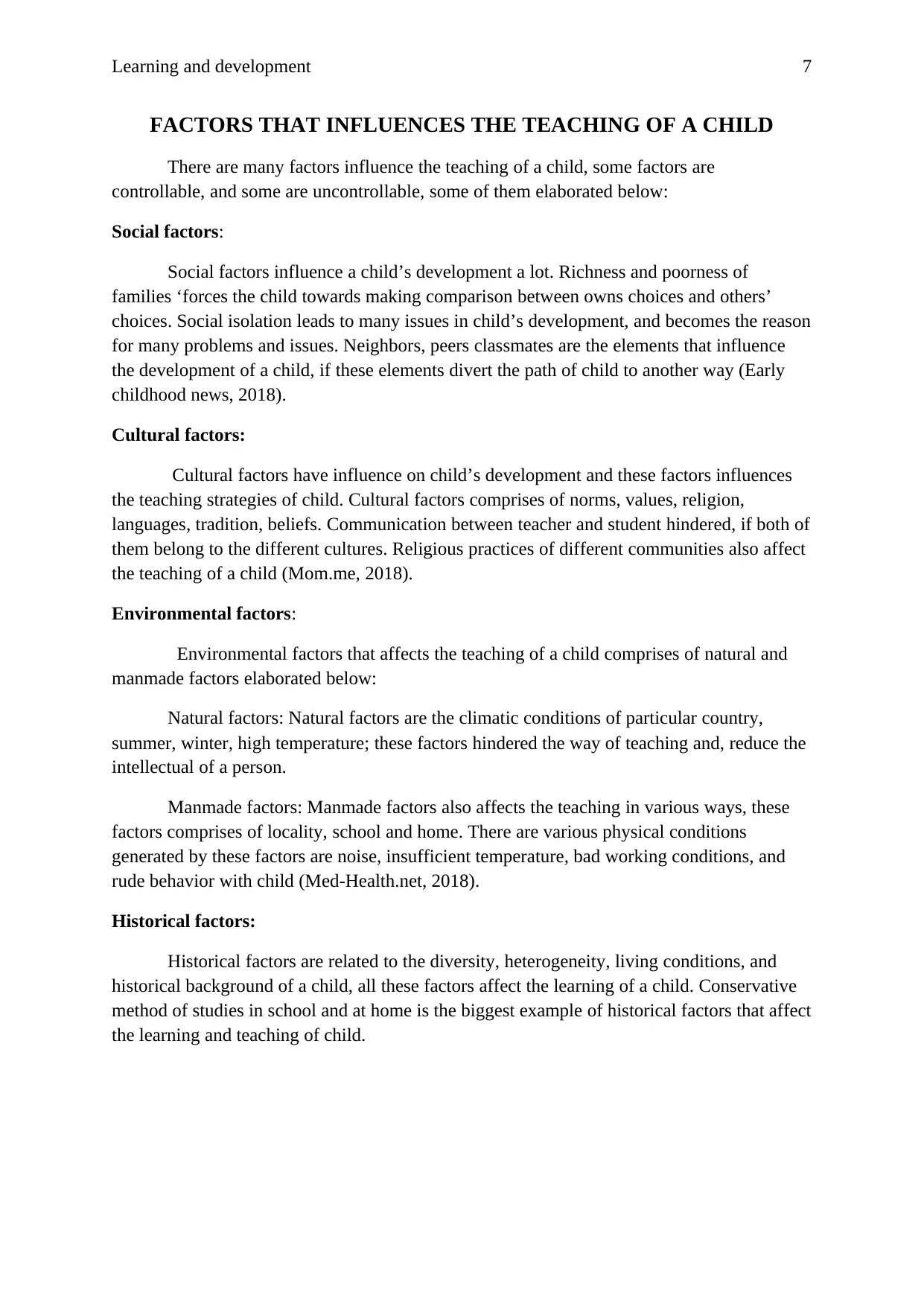
Learning and development 7
FACTORS THAT INFLUENCES THE TEACHING OF A CHILD
There are many factors influence the teaching of a child, some factors are
controllable, and some are uncontrollable, some of them elaborated below:
Social factors:
Social factors influence a child’s development a lot. Richness and poorness of
families ‘forces the child towards making comparison between owns choices and others’
choices. Social isolation leads to many issues in child’s development, and becomes the reason
for many problems and issues. Neighbors, peers classmates are the elements that influence
the development of a child, if these elements divert the path of child to another way (Early
childhood news, 2018).
Cultural factors:
Cultural factors have influence on child’s development and these factors influences
the teaching strategies of child. Cultural factors comprises of norms, values, religion,
languages, tradition, beliefs. Communication between teacher and student hindered, if both of
them belong to the different cultures. Religious practices of different communities also affect
the teaching of a child (Mom.me, 2018).
Environmental factors:
Environmental factors that affects the teaching of a child comprises of natural and
manmade factors elaborated below:
Natural factors: Natural factors are the climatic conditions of particular country,
summer, winter, high temperature; these factors hindered the way of teaching and, reduce the
intellectual of a person.
Manmade factors: Manmade factors also affects the teaching in various ways, these
factors comprises of locality, school and home. There are various physical conditions
generated by these factors are noise, insufficient temperature, bad working conditions, and
rude behavior with child (Med-Health.net, 2018).
Historical factors:
Historical factors are related to the diversity, heterogeneity, living conditions, and
historical background of a child, all these factors affect the learning of a child. Conservative
method of studies in school and at home is the biggest example of historical factors that affect
the learning and teaching of child.
FACTORS THAT INFLUENCES THE TEACHING OF A CHILD
There are many factors influence the teaching of a child, some factors are
controllable, and some are uncontrollable, some of them elaborated below:
Social factors:
Social factors influence a child’s development a lot. Richness and poorness of
families ‘forces the child towards making comparison between owns choices and others’
choices. Social isolation leads to many issues in child’s development, and becomes the reason
for many problems and issues. Neighbors, peers classmates are the elements that influence
the development of a child, if these elements divert the path of child to another way (Early
childhood news, 2018).
Cultural factors:
Cultural factors have influence on child’s development and these factors influences
the teaching strategies of child. Cultural factors comprises of norms, values, religion,
languages, tradition, beliefs. Communication between teacher and student hindered, if both of
them belong to the different cultures. Religious practices of different communities also affect
the teaching of a child (Mom.me, 2018).
Environmental factors:
Environmental factors that affects the teaching of a child comprises of natural and
manmade factors elaborated below:
Natural factors: Natural factors are the climatic conditions of particular country,
summer, winter, high temperature; these factors hindered the way of teaching and, reduce the
intellectual of a person.
Manmade factors: Manmade factors also affects the teaching in various ways, these
factors comprises of locality, school and home. There are various physical conditions
generated by these factors are noise, insufficient temperature, bad working conditions, and
rude behavior with child (Med-Health.net, 2018).
Historical factors:
Historical factors are related to the diversity, heterogeneity, living conditions, and
historical background of a child, all these factors affect the learning of a child. Conservative
method of studies in school and at home is the biggest example of historical factors that affect
the learning and teaching of child.
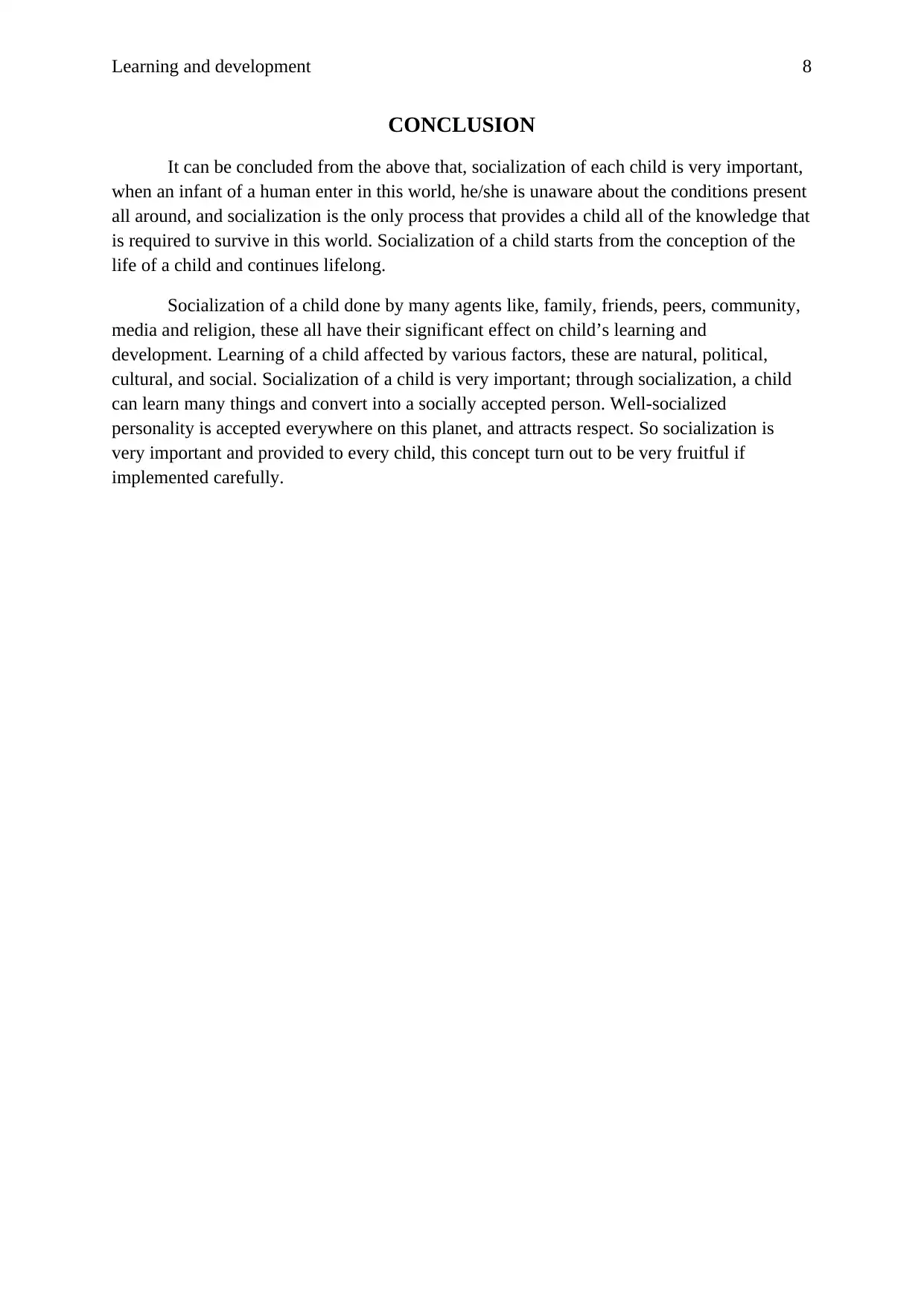
Learning and development 8
CONCLUSION
It can be concluded from the above that, socialization of each child is very important,
when an infant of a human enter in this world, he/she is unaware about the conditions present
all around, and socialization is the only process that provides a child all of the knowledge that
is required to survive in this world. Socialization of a child starts from the conception of the
life of a child and continues lifelong.
Socialization of a child done by many agents like, family, friends, peers, community,
media and religion, these all have their significant effect on child’s learning and
development. Learning of a child affected by various factors, these are natural, political,
cultural, and social. Socialization of a child is very important; through socialization, a child
can learn many things and convert into a socially accepted person. Well-socialized
personality is accepted everywhere on this planet, and attracts respect. So socialization is
very important and provided to every child, this concept turn out to be very fruitful if
implemented carefully.
CONCLUSION
It can be concluded from the above that, socialization of each child is very important,
when an infant of a human enter in this world, he/she is unaware about the conditions present
all around, and socialization is the only process that provides a child all of the knowledge that
is required to survive in this world. Socialization of a child starts from the conception of the
life of a child and continues lifelong.
Socialization of a child done by many agents like, family, friends, peers, community,
media and religion, these all have their significant effect on child’s learning and
development. Learning of a child affected by various factors, these are natural, political,
cultural, and social. Socialization of a child is very important; through socialization, a child
can learn many things and convert into a socially accepted person. Well-socialized
personality is accepted everywhere on this planet, and attracts respect. So socialization is
very important and provided to every child, this concept turn out to be very fruitful if
implemented carefully.
⊘ This is a preview!⊘
Do you want full access?
Subscribe today to unlock all pages.

Trusted by 1+ million students worldwide
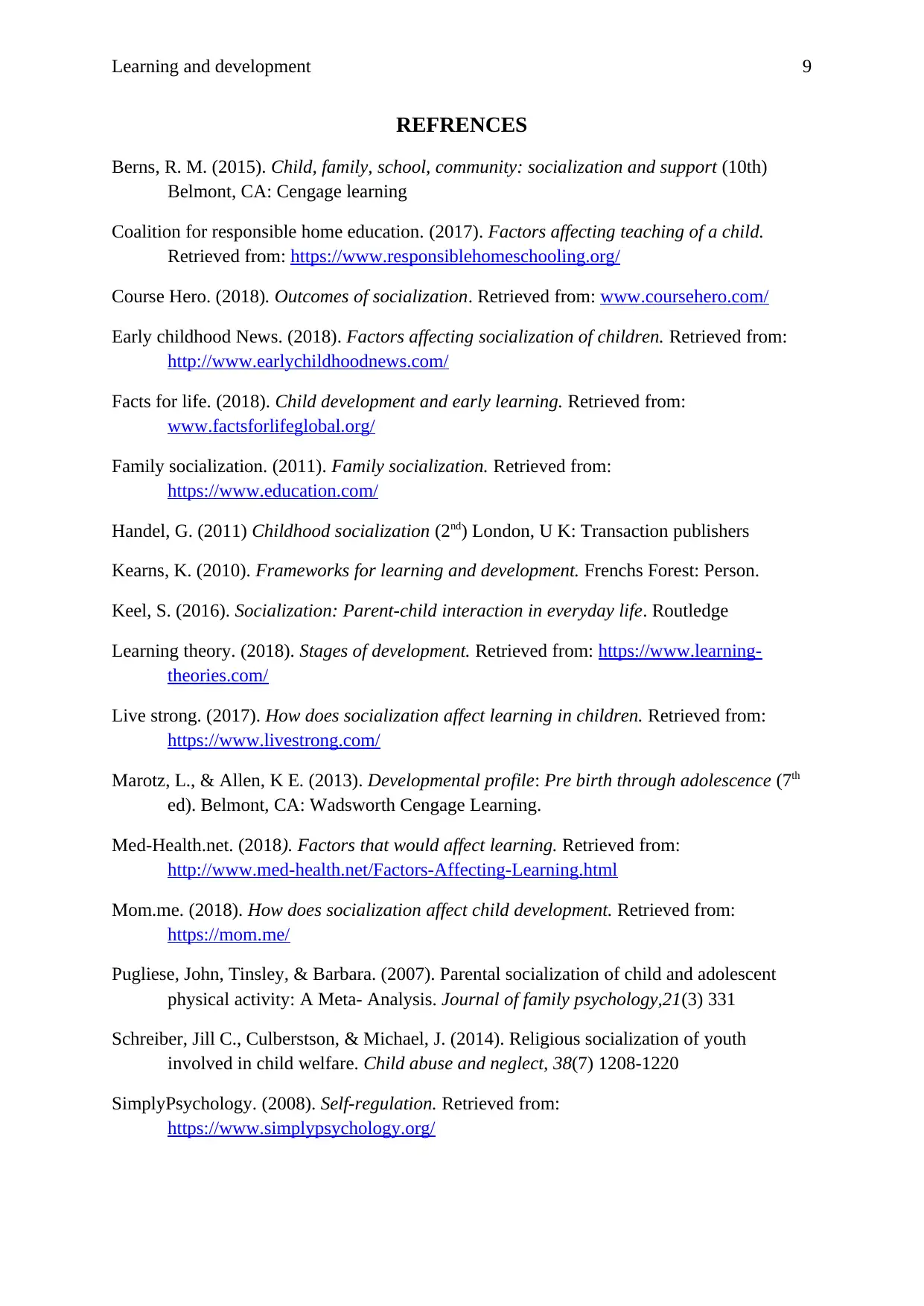
Learning and development 9
REFRENCES
Berns, R. M. (2015). Child, family, school, community: socialization and support (10th)
Belmont, CA: Cengage learning
Coalition for responsible home education. (2017). Factors affecting teaching of a child.
Retrieved from: https://www.responsiblehomeschooling.org/
Course Hero. (2018). Outcomes of socialization. Retrieved from: www.coursehero.com/
Early childhood News. (2018). Factors affecting socialization of children. Retrieved from:
http://www.earlychildhoodnews.com/
Facts for life. (2018). Child development and early learning. Retrieved from:
www.factsforlifeglobal.org/
Family socialization. (2011). Family socialization. Retrieved from:
https://www.education.com/
Handel, G. (2011) Childhood socialization (2nd) London, U K: Transaction publishers
Kearns, K. (2010). Frameworks for learning and development. Frenchs Forest: Person.
Keel, S. (2016). Socialization: Parent-child interaction in everyday life. Routledge
Learning theory. (2018). Stages of development. Retrieved from: https://www.learning-
theories.com/
Live strong. (2017). How does socialization affect learning in children. Retrieved from:
https://www.livestrong.com/
Marotz, L., & Allen, K E. (2013). Developmental profile: Pre birth through adolescence (7th
ed). Belmont, CA: Wadsworth Cengage Learning.
Med-Health.net. (2018). Factors that would affect learning. Retrieved from:
http://www.med-health.net/Factors-Affecting-Learning.html
Mom.me. (2018). How does socialization affect child development. Retrieved from:
https://mom.me/
Pugliese, John, Tinsley, & Barbara. (2007). Parental socialization of child and adolescent
physical activity: A Meta- Analysis. Journal of family psychology,21(3) 331
Schreiber, Jill C., Culberstson, & Michael, J. (2014). Religious socialization of youth
involved in child welfare. Child abuse and neglect, 38(7) 1208-1220
SimplyPsychology. (2008). Self-regulation. Retrieved from:
https://www.simplypsychology.org/
REFRENCES
Berns, R. M. (2015). Child, family, school, community: socialization and support (10th)
Belmont, CA: Cengage learning
Coalition for responsible home education. (2017). Factors affecting teaching of a child.
Retrieved from: https://www.responsiblehomeschooling.org/
Course Hero. (2018). Outcomes of socialization. Retrieved from: www.coursehero.com/
Early childhood News. (2018). Factors affecting socialization of children. Retrieved from:
http://www.earlychildhoodnews.com/
Facts for life. (2018). Child development and early learning. Retrieved from:
www.factsforlifeglobal.org/
Family socialization. (2011). Family socialization. Retrieved from:
https://www.education.com/
Handel, G. (2011) Childhood socialization (2nd) London, U K: Transaction publishers
Kearns, K. (2010). Frameworks for learning and development. Frenchs Forest: Person.
Keel, S. (2016). Socialization: Parent-child interaction in everyday life. Routledge
Learning theory. (2018). Stages of development. Retrieved from: https://www.learning-
theories.com/
Live strong. (2017). How does socialization affect learning in children. Retrieved from:
https://www.livestrong.com/
Marotz, L., & Allen, K E. (2013). Developmental profile: Pre birth through adolescence (7th
ed). Belmont, CA: Wadsworth Cengage Learning.
Med-Health.net. (2018). Factors that would affect learning. Retrieved from:
http://www.med-health.net/Factors-Affecting-Learning.html
Mom.me. (2018). How does socialization affect child development. Retrieved from:
https://mom.me/
Pugliese, John, Tinsley, & Barbara. (2007). Parental socialization of child and adolescent
physical activity: A Meta- Analysis. Journal of family psychology,21(3) 331
Schreiber, Jill C., Culberstson, & Michael, J. (2014). Religious socialization of youth
involved in child welfare. Child abuse and neglect, 38(7) 1208-1220
SimplyPsychology. (2008). Self-regulation. Retrieved from:
https://www.simplypsychology.org/
Paraphrase This Document
Need a fresh take? Get an instant paraphrase of this document with our AI Paraphraser
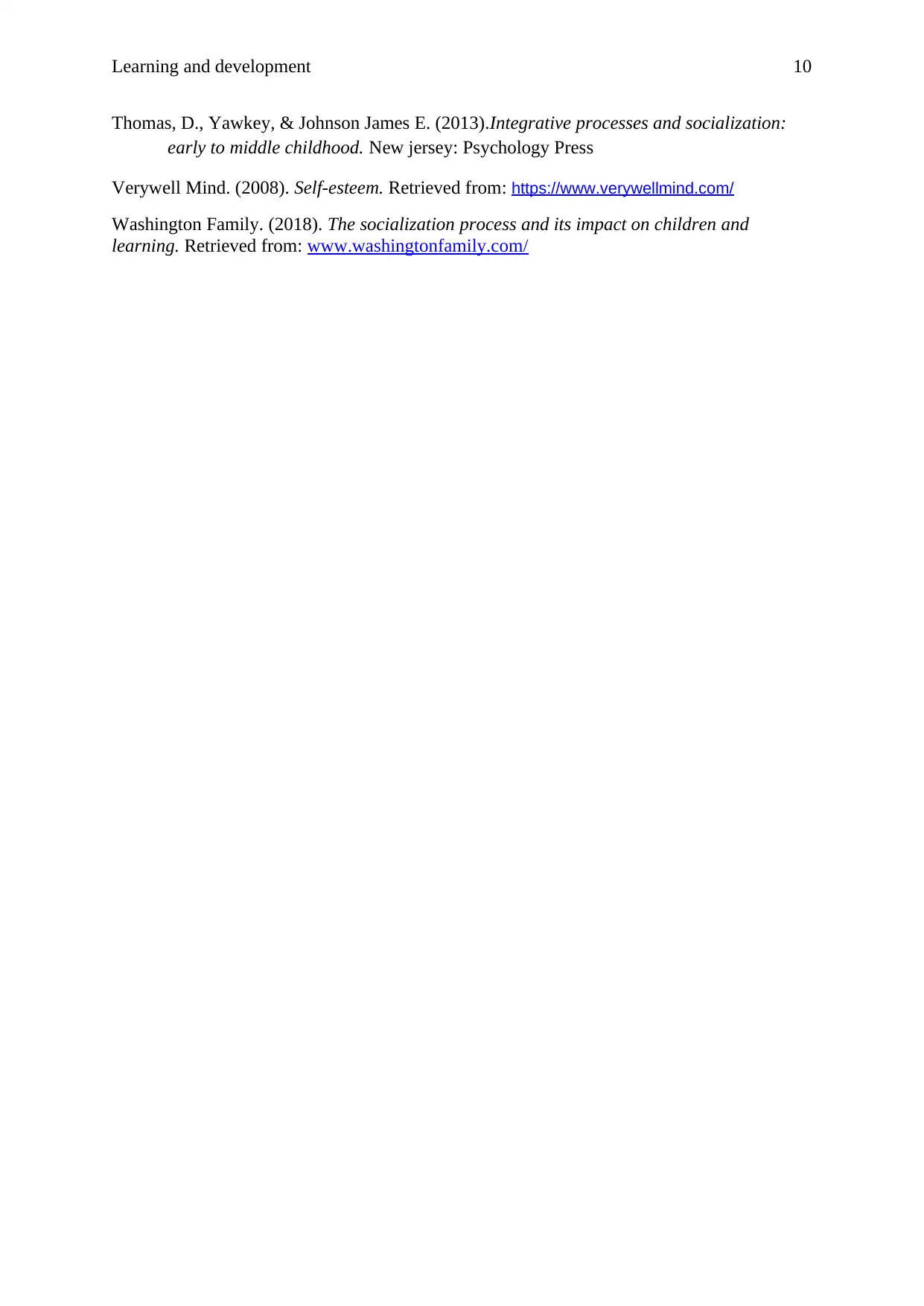
Learning and development 10
Thomas, D., Yawkey, & Johnson James E. (2013).Integrative processes and socialization:
early to middle childhood. New jersey: Psychology Press
Verywell Mind. (2008). Self-esteem. Retrieved from: https://www.verywellmind.com/
Washington Family. (2018). The socialization process and its impact on children and
learning. Retrieved from: www.washingtonfamily.com/
Thomas, D., Yawkey, & Johnson James E. (2013).Integrative processes and socialization:
early to middle childhood. New jersey: Psychology Press
Verywell Mind. (2008). Self-esteem. Retrieved from: https://www.verywellmind.com/
Washington Family. (2018). The socialization process and its impact on children and
learning. Retrieved from: www.washingtonfamily.com/
1 out of 11
Related Documents
Your All-in-One AI-Powered Toolkit for Academic Success.
+13062052269
info@desklib.com
Available 24*7 on WhatsApp / Email
![[object Object]](/_next/static/media/star-bottom.7253800d.svg)
Unlock your academic potential
Copyright © 2020–2026 A2Z Services. All Rights Reserved. Developed and managed by ZUCOL.





